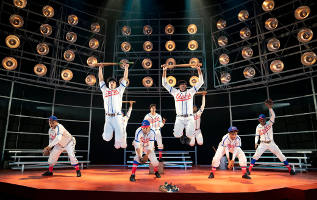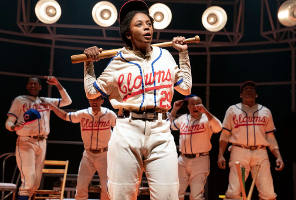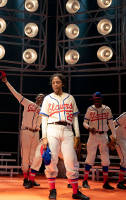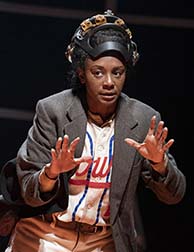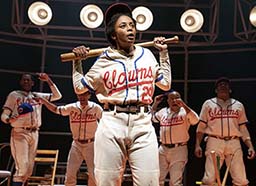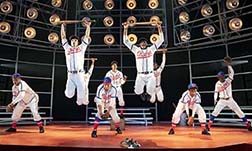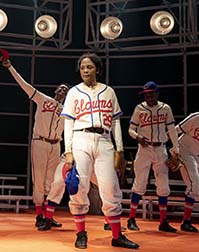
TWO VIEWS OF "TONI STONE"
by Ed Rubin
by Lucy Komisar
|
"Toni Stone," April Matthis, as Toni Stone (1921-1996) the first woman to play professional baseball in the Negro League, is knocking it out of the ballpark every night at the Laura Pels Theatre through August 11. The play, lightly based on Martha Ackmann’s book “Curveball: The Remarkable Story of Toni Stone,” is overwhelmingly inspirational, deeply humane, and totally moving.
With Toni Stone, the bases are loaded with the crème de la crème of the theatrical world – from Lydia R. Diamond’s poetically crafted play to Tony Award-winning director Pam MacKinnon’s direction and the inventive choreography by Camille A. Brown – all of whose finely calibrated work radiate a deeply ingrained brilliance. Temporarily casting aside the play’s exceedingly fine male ensemble (there are eight teammates some of whom play dual roles, both gender and racial), it is 2015 Obie Award winner April Matthis who turns in a truly star-making performance around which everything whirls for two hours and ten minutes. She brings Toni Stone and her little-known story alive and kicking into the world. As the play’s sole electrifying story-telling narrator, Matthis’ performance is simply mesmerizing.
“I’m not a big talker,” she informs us as the play opens. “I talk a lot, but I don’t talk big. I have pride, but I wouldn’t say I’m proud. I don’t put more in a story then is really there. And I don’t like it when other people do. So don’t think I’m bragging when I tell you that I do the things I do well, bettern’ anybody. I am prone to ramblin’. Never could tell a story from beginning to end all nice and neat. My brain don’t work that way.”
True to her word, the play’s scenes which cover the years from 1920 into the 1950s jump back from one decade to another, quite surprisingly adding a sensuous feeling of wonder to Toni Stone’s life and times. We hear about her growing up a tomboy in St. Paul, her interest in sports – figure skating among them – and her deep love of everything about baseball. It was a love so intense that a baseball mitt and ball, both of which she poetically canonizes, rarely left her hand. Equally beguiling is the playwright’s genius which gives us scenes with just enough detail to let us fill in any perceived informational gaps. It is this sureness of Diamond’s hand that steers this play away from the shores of your typical fact and figure-filled biographical boredom. Stone sets the scene early on by introducing us to Sydney Pollack. “Meet Sydney Pollack. He’s white. He’s the owner of the Clowns. Nice man, good heart, pays better than the other owners, white or black. He takes as good a care of us as any white man would think he should. Still, you hear what I said? He the owner. He own us.” Next we meet Toni’s teammates, Eric Berryman, Harvey Blanks, Phillip James Brannon, Daniel J. Bryant, Jonathan Burke, Toney Goins, Kenn E. Head, Ezra Knight, all of who she calls her” boys.” Giving each player a personality, she playfully highlights their most recognizable trait.
Some are singled out for playing flashy and playing hard. Others are identified for keeping company with a bottle, being popular with the ladies, being the toughest lefthander she ever met, being the handsomest, and the best at clowning around. They are all at the top of their game we are told. Along the way the audience is made privy, no doubt many for the first time, to the inner workings of the Negro League. It was not always a pretty picture either on the field or off for Toni or her team. Racial segregation was at its height during the years she was playing, and blacks were treated, be they entertainers or athletes, as second-class citizens. They were denied entrance to white hotels and restaurants and heckled by whites in the grandstands where they played. On the field some Negro teams were not only required to play ball but to add minstrel-like entertainment to the mix, thus explaining the Indianapolis Clowns, the title of Toni’s team. In some cases, as Toni tells it, team owners scheduled them opposite a white team. “We was to give a show, make ‘em look good, let ‘em win, and get a cut but sometimes you just don’t have the lose in you.” When this happened the team had to beat it out of town before the town was beat out of them.
Many a night when there were no local black establishments to put them up Toni and the team found themselves sleeping on their bus. Occasionally, when Toni, (and presumably her teammates though this we do not see this), were too tired to drive a few hundred miles to the next day’s game, electing to spend the night at a black brothel on the outskirts of town. It is at a brothel where Toni forms a close friendship with Millie, one of the ladies of the night who is played sensitively by Kenn E. Head. It is Millie, in several compelling scenes, filled with intimate talks with Toni about men, sex, relationships, and how to wear your hair and apply makeup, that Toni learns there is more to life than baseball. It is then that she decides to pay more attention to a three decade’s older businessman Audacious Alberga (a marvelous Harvey Blanks who wages a long and successful battle to get Toni to marry him) Alberga was especially amazed – as was the audience – by Toni’s “encyclopedic knowledge of anything that’s ever happened on a baseball filed, anywhere is the western world. Like Millie, Blanks, when not in character, also doubles as a teammate. Suave to say the least, it was a joy, as well as great fun to watch Alberga, step by step, sweettalk his way into Toni’s heart. Adding to the production’s overall magic with well thought out touches that hold the entire play from flying out the window is the work of the production’s designers, all of who wisely let the let the play speak for itself.
Set Designer Riccardo Hernandez used plain wooden movable set pieces
(benches, chairs etc) that the cast could easily move from scene
to scene. Lighting designer Allen Lee Hughes chose to duplicate
stadium atmosphere by placing a full back wall of stadium lights.
Costume Designer Dede Ayite’s mid-century baggy baseball
are uniforms are spot on but the coup de gras was Millie’s
delicate and beautifully flowing robe that all but convinced us
that Kenn E. Head was truly a woman.
by Lucy Komisar April Matthis is captivating as “Toni Stone,” America’s first female professional baseball player “Toni Stone.”
April Matthis gives a standout performance as Toni Stone, making you want to cheer and pump your fists as she knocks down barriers. Playwright Lydia Diamond, director Pam MacKinnon and choreographer Camille Brown, an all-woman star team, turn the quirkiness of the characters and the situation into a realistic and exceptionally entertaining narrative, from Toni’s childhood through her time as a prominent sportswoman, who you probably never heard of. Stone was born in West Virginia and the family moved to St. Paul, Minn., when she was 10. It makes me wonder about Matthis’ thick southern accent, but maybe that’s due to a family that never lost it. She is strong, not just in her arm, but in her will. She is a feminist when it comes to herself, her dreams, never putting herself second to any man. She is astonished as a young girl when another girl who is “supposed to be a good influence or some such. And what I’m trying to say is, she talk about boys like without them a piece of her is missing.” As a child, she can’t sit still in church. And she doesn’t like the idea of people of other religions going to hell. She remarks, “it just wouldn’t make sense for them to have to be in hell with the people that hate and kill people who look like me.” When her parents try to get her off baseball and send her to figure-skating classes and track, she comes home with trophies. She hangs onto a fence to listen in Gaby, white coach of a kids’ group, strategizing about pitching. He chases her away.
But she goes back to the diamond. For her, baseball is poetry. Her opening monologue is about the ball, “The weight of it in my hands.” “I’m telling you about reaching.” That will be physical and symbolic. She says, “I am prone to rambling,” but the rambles are incisive. The set (by Riccardo Hernandez) is constructed from the iconic elements of a stadium: around the top and sides are large lights of the sort that light night games, on a wood stage are three sets of three-tiered bleachers. Stone’s quirkiness helps her navigate the shoals of life. She is literal and does not get diverted. It means she doesn’t understand when a man is coming on to her. When one of the players says, “I wouldn’t throw you outta my bed for eating crackers,” she replies, “Why would I eat crackers in your bed? Why would anyone eat crackers in a bed? They are very messy.” Sometimes the players move in the dugout or though an imaginary field in a dance, twirling bats, jumping over them. The smart choreography is by Camille A. Brown.
As a player getting attention, and a charmer in her own way, she is courted by a businessman who has money and a house, but she tells him in so many words he is not at the top of her agenda. When she joins the Indianapolis Clowns, the white owner (with a James Stewart accent) wrangles over pay and pushes back when he forces her to take soft pitches. My favorite of her teammates was the very funny King Tut (a terrific Phillip James Brannon), based on a real person. Part of the Clowns’ appeal was their hokey routines and King Tut was one of the most famous comedians in the Negro League. Spec Bebop (the very good Daniel J. Bryant) was his sidekick. Spec totes books and repeats famous phrases from Frederick Douglas, Harriet Tubman, and Ida B Wells. Stretch (Eric Berryman) is a serious guy who takes a portion of the boys’ pay to send to their families. Her teammates weren’t all so nice. Woody (Ezra Knight), a nasty older guy, is humiliated by Toni on the field and savages her with sexual threats.
She deals with the difficulties of the tours, the smelly buses, often no place to eat or sleep in the segregated South except the homes of local supporters or even bordellos. In one, she becomes friends with Millie (Kenne E. Head), a prostitute, her first female friend, who gives her sisterly advice on clothes, hair and men. Some of the games had black and white teams competing, and we hear the screaming taunts and racist insults from local whites when the Clowns have bested their players. In such situations, after the game they race to the bus. Stone takes a year off after marrying her smitten suitor and even learns to cook, but she won’t take orders from him. Of course, she goes back to the game. It’s a compelling story, funny, moving, a bit sad when you know what might have been had she been white and male. But making the best of what she had, she spun it into gold. So did the playwright and director.
Visit Lucy’s website http://thekomisarscoop.com/ |
| recordings | coupons | publications | classified |


